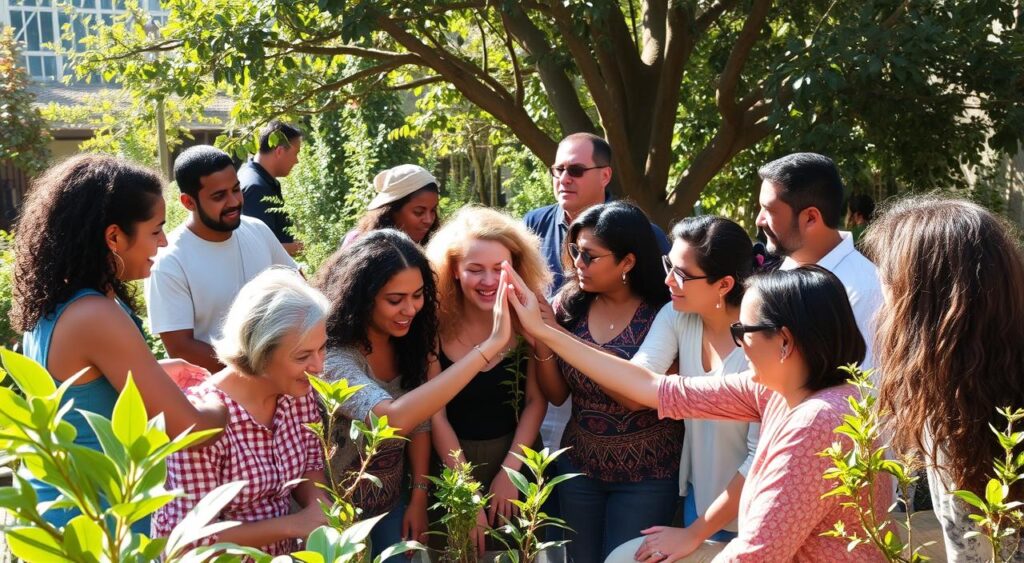Ever pondered if the pursuit of inner peace is the gateway to personal growth? In today’s rapid world, the connection between self-improvement and spirituality is more critical than ever. People often look for concrete outcomes from their self-improvement quests. It’s vital to understand how focusing on these areas can bring about significant life transformations. As you embark on this journey, you’ll discover the profound impact of boosting your well-being, leading to greater life fulfillment and stronger bonds with others.
Key Takeaways
- Self-improvement and spirituality are intertwined paths that promote personal growth.
- Prioritizing your journey can unlock greater inner peace and life satisfaction.
- Deep engagement with spiritual practices can enhance emotional well-being.
- Setting intentional goals in self-improvement is essential for meaningful progress.
- Joining a supportive community can facilitate your growth journey.
Understanding Self-Improvement and Spirituality
Embarking on a self-improvement journey is a transformative path towards personal development. It focuses on honing skills and emotional growth. This process involves self-reflection on strengths and weaknesses, aiming for continuous improvement. Many seek self-improvement to elevate their quality of life and personal fulfillment.
Spirituality, on the other hand, connects you with something beyond yourself. It offers insights that deepen your understanding of personal growth. About 60% of people engage in spiritual practices, underscoring the widespread interest in spirituality and its role in self-improvement.
Both self-improvement and spirituality offer enriching experiences, each with its unique benefits. Research shows that 70% of individuals find prayer or meditation helpful in managing stress and anxiety. This highlights the practical value of integrating spirituality into self-improvement. Spiritual beliefs also provide resilience, with 65% crediting these practices for navigating life’s challenges.
The table below showcases key statistics that highlight the importance of self-improvement and spirituality:
| Statistic | Percentage | Significance |
|---|---|---|
| Individuals engaged in spiritual practices | 60% | Demonstrates interest in spirituality |
| Belief in prayer/meditation helping stress | 70% | Indicates practical benefits |
| Regular gratitude practitioners feeling fulfilled | 80% | Enhances overall happiness |
| Feeling spiritual support is critical | 75% | Highlights relational needs in crisis |
| Engaging in prayer/meditation daily | 55% | Shows commitment to spirituality |
The Importance of Personal Growth
Personal growth is the cornerstone of a fulfilling life. Adopting a growth mindset drives you to continually improve and understand yourself better. This leads to stronger relationships and greater personal satisfaction. It also prepares you to handle life’s challenges and deepens your spiritual journey.
Benefits of Commitment to Growth
Committing to personal growth brings significant advantages. It builds resilience, essential for overcoming life’s obstacles. You’ll see improvements in your mental health, developing strategies to manage stress and anxiety. A positive outlook emerges, boosting your motivation and confidence.
Every step toward personal growth shifts your perspective, empowering you to face challenges with confidence and creativity.
How to Set Personal Growth Goals
Setting personal growth goals offers a clear path forward. Use the SMART criteria—Specific, Measurable, Achievable, Relevant, and Time-bound—to set realistic targets. Begin by identifying self-improvement techniques that appeal to you. Break down your goals into smaller tasks to track your progress and celebrate achievements.
This method keeps you focused and committed to your growth journey. It fosters a deeper dedication to personal development.

Defining Inner Peace in Your Life
Inner peace is essential for emotional health and managing stress. Learning how to achieve it can greatly improve your well-being and resilience. By using specific techniques and building resilience, you can develop a calm mindset. This mindset helps you navigate life’s challenges.
Techniques to Cultivate Inner Peace
Several effective techniques can help you cultivate inner peace:
- Meditation: Engaging in meditation allows you to find clarity and tranquility, fostering a deeper connection with your thoughts and emotions.
- Deep-breathing exercises: These practices promote relaxation, reducing stress levels and improving emotional health.
- Visualization: Picture a peaceful scene or a positive outcome in challenging situations. This technique strengthens your mental resilience while encouraging emotional balance.
Regularly practicing these techniques encourages mindfulness. Mindfulness is key to achieving lasting inner peace and effective stress management.
Understanding the Role of Resilience
Resilience is critical in your journey toward inner peace. It’s about recovering from stress and adversity, which greatly impacts your emotional health. Those who nurture resilience can better handle life’s inevitable challenges. This enhances their ability to maintain inner peace.
Building resilience involves recognizing personal strengths, learning from past experiences, and developing a support system. By cultivating these attributes, you prepare yourself to navigate life’s ups and downs. This preserves a state of inner peace.
Mindfulness Practices for Everyday Living
Adding mindfulness to your daily life can change everything. It boosts self-awareness and sharpens your mental focus. Daily mindfulness exercises bring calm and stability, making life’s hurdles more manageable.
Easy Mindfulness Exercises You Can Start Today
Embarking on mindfulness doesn’t need complex training. Simple activities can greatly improve your mindfulness. Here are some easy exercises to try:
- Mindful Breathing: Concentrate on your breath. Breathe in deeply through your nose and out slowly through your mouth.
- Body Scans: Scan your body from top to bottom, noticing any feelings or tightness.
- Gratitude Journaling: Write down things you’re thankful for each day, cultivating positivity.
These exercises can be seamlessly added to your daily routine. They boost your well-being and help you face life’s challenges with a mindful attitude.
Integrating Mindfulness into Your Routine
Building routines that support mindfulness can lead to lasting benefits. Here are ways to incorporate mindfulness into your daily activities:
- Morning Rituals: Begin your day with a few minutes of quiet reflection or meditation.
- Mindful Walking: Take short, focused walks during breaks, paying attention to each step.
- Mindful Eating: Spend time enjoying your meals without distractions, fully experiencing each bite.
By adopting these habits, you create an environment that supports mindfulness all day. This enhances your personal growth and spiritual journey.

| Mindfulness Exercises | Benefits | How to Practice |
|---|---|---|
| Mindful Breathing | Reduces stress and increases focus | Set aside 5-10 minutes for breath focus |
| Body Scans | Enhances body awareness | Lie down and visualize each body part |
| Gratitude Journaling | Boosts overall mood and outlook | Write down three things daily that you’re grateful for |
| Mindful Walking | Increases mindfulness in movement | Walk slowly while focusing on each step |
| Mindful Eating | Promotes healthier eating habits | Eat without distractions, focusing on flavors |
By practicing these mindfulness techniques, you lay the groundwork for greater awareness and empowerment. This journey to self-improvement is well underway.
Embarking on a Spiritual Awakening Journey
Starting a spiritual awakening journey can be life-changing. It often begins with a strong desire for self-discovery. This desire prompts individuals to look for deeper meanings in life. They explore their beliefs, values, and connections to the universe.

As you move through this phase, you might notice certain signs. These signs include:
- Increased awareness of your emotions and thoughts.
- A yearning for deeper connections and understanding.
- Shifts in perspectives about life and relationships.
- A sense of inner peace, despite external chaos.
- Heightened intuition and gut feelings.
Personal transformation happens through self-reflection. This encourages you to align with your inner truth. By acknowledging and accepting your experiences, you gain a profound understanding of yourself. This understanding often leads to lasting changes that bring greater fulfillment.
Remember, each person’s journey is unique. Embrace the process, seeing uncertainty as a chance for growth. Your dedication to personal transformation and self-discovery will guide you on this enriching path.
Techniques for Self-Development
Starting a self-development journey opens up a world of personal growth opportunities. There are many self-development techniques, each with its own benefits tailored to individual needs. Understanding these methods allows you to explore a variety of personal growth tools, enriching your journey.
Exploring Various Self-Development Approaches
Diverse self-development techniques can transform your life and broaden your self-understanding. Common methods include:
- Journaling – This practice facilitates reflection and clarity, allowing you to express thoughts and emotions.
- Coaching – Working with a coach can provide structured guidance, fostering accountability and targeted growth.
- Online Courses – Numerous platforms offer learning strategies that cater to a wide variety of topics and interests.
- Workshops – Engaging in hands-on experiences helps deepen your understanding of specific techniques.

Picking the Right Techniques for You
Finding the right self-development techniques is key to meaningful growth. To identify methods that resonate with you, follow these steps:
- Assess Your Goals – Clearly define what you want to achieve through your personal growth journey.
- Match Techniques to Your Personality – Consider which approaches feel natural and engaging for you.
- Experiment and Reflect – Try different strategies, noting what contributes positively to your self-improvement.
- Seek Feedback – Engaging with peers or mentors can provide insights into your progress and experiences.
Choosing the right self-development techniques leads to a more fulfilling experience. It guides you toward a successful personal growth journey.
| Technique | Description | Best For |
|---|---|---|
| Journaling | Expressing thoughts and emotions in written form. | Those who thrive on reflection. |
| Coaching | One-on-one guidance focused on personal goals. | Individuals seeking accountability. |
| Online Courses | Structured learning on various subjects. | Self-motivated learners. |
| Workshops | Interactive sessions designed for hands-on learning. | Those who prefer community engagement. |
Embracing the Self-Awareness Journey
Self-awareness is a key to personal growth. It helps you understand your thoughts, emotions, and motivations. This understanding allows you to better grasp how you react to different situations. It also helps you see how these reactions impact your emotional intelligence.
As you grow in self-awareness, you become better at managing your emotions. This improvement leads to stronger relationships with family, friends, and colleagues. Developing emotional intelligence strengthens these bonds, helping you build deeper connections that support your spiritual goals.

To embark on the self-awareness journey, reflect on your experiences and the emotions they evoke. Here are some steps to guide you:
- Regular self-reflection: Allocate time each week to analyze your emotional responses and the triggers behind them.
- Journaling: Writing down your thoughts can reveal patterns in your feelings and reactions, providing insight.
- Seeking feedback: Ask people you trust for their views on your behavior and communication styles.
- Mindfulness practices: Engage in mindfulness exercises to stay present and aware of your feelings in the moment.
Strengthening self-awareness boosts emotional intelligence and frees you from negative patterns. By becoming more aware, you can make positive changes. This creates a supportive environment in your personal and spiritual life.
| Self-Awareness Practices | Benefits |
|---|---|
| Regular self-reflection | Increases understanding of emotional triggers |
| Journaling | Reveals recurring themes and personal insights |
| Seeking feedback | Helps identify blind spots in personal interactions |
| Mindfulness practices | Enhances present-moment awareness and emotional regulation |
Embracing self-awareness sets the stage for meaningful connections and a more fulfilling spiritual life.
Holistic Wellness: A Comprehensvie Approach to Life
Achieving holistic wellness means nurturing the connection between mind, body, and spirit. It’s about finding balance in life. Enhancing mental, physical, and spiritual health is interconnected. Striving for equilibrium in these areas leads to personal growth and overall wellness.
The Interconnection Between Mind, Body, and Spirit
Your journey to holistic wellness starts with understanding how different aspects of your being interact. When physical health declines, mental clarity often suffers. Emotional disturbances can also manifest physically. Recognizing these connections helps you take proactive steps towards better well-being.
Practices to Foster Holistic Wellness
Integrating various wellness practices into your routine is key to a harmonious lifestyle. Here are some effective methods:
- Yoga: This ancient practice unites body, mind, and spirit, promoting physical strength and mental clarity.
- Meditation: Regular meditation can reduce stress and enhance emotional state.
- Nutrition: A balanced diet supports your body’s needs, influencing both physical health and mental well-being.
- Physical Exercise: Activities you enjoy help maintain fitness and improve mood.

By embracing holistic wellness and integrating these practices, you pave the way for a more fulfilling life.
| Practice | Benefit |
|---|---|
| Yoga | Enhances flexibility, strength, and mental relaxation |
| Meditation | Reduces anxiety and increases emotional resilience |
| Nutrition | Improves overall health and boosts energy levels |
| Physical Exercise | Promotes cardiovascular health and relieves stress |
Spiritual Enlightenment: What It Means
Spiritual enlightenment is a transformative journey filled with clarity, connection, and peace. It often results from personal growth, pushing individuals to explore their existence’s deeper aspects. Recognizing the signs of spiritual enlightenment can guide you toward awakening and deepen your understanding of life’s purpose.
Signs of Spiritual Enlightenment
Understanding the signs of spiritual enlightenment helps identify your journey’s stage. Here are some key indicators:
- Heightened Empathy: You feel a stronger connection to others’ emotions and experiences.
- Renewed Sense of Purpose: Your life direction becomes clearer, aligning with your inner values.
- Increased Mindfulness: You become more present, appreciating life’s simple joys.
- Non-Attachment: You feel less need for material possessions or external validation.
- Inner Peace: You experience a stable sense of calm, regardless of external circumstances.
Your journey toward spiritual enlightenment may lead to significant changes in your beliefs and worldview. Committing to this path can catalyze lasting personal transformation, improving your life’s quality.

The Role of Community in Growth
Joining a personal growth community can greatly boost your self-improvement and spiritual journey. Being part of supportive networks offers inspiration and a sense of belonging. It creates a space where everyone can grow together, fueled by collective motivation.
Finding Like-Minded Individuals
Finding groups that match your values and goals is essential. Look for local workshops, online forums, or social media groups focused on personal development and spirituality. These platforms offer a chance to connect with those who share your journey, providing encouragement and strategies for overcoming obstacles.
Building a Support System
Building a strong support system is key to staying motivated and accountable. Reach out to friends, family, or colleagues who are also on their growth path. Open discussions can share experiences and resources. A diverse support system can significantly influence your growth, as collective wisdom and encouragement can propel you forward.

Overcoming Obstacles in Self-Improvement
Every self-improvement journey comes with obstacles. Success hinges on recognizing and overcoming these hurdles. Common barriers include fear, procrastination, and external pressures. By mastering strategies to address these, you empower yourself to conquer self-improvement challenges.
Common Roadblocks and How to Tackle Them
Fear is often the biggest obstacle on your self-improvement path. It may stem from fear of failure or the unknown. Here are some strategies to manage it:
- Identify your fears: Acknowledge the specific fears that are holding you back.
- Small steps: Break your goals into manageable parts to create a pathway to success.
- Seek support: Engage with mentors or peers who encourage and inspire growth.
Procrastination can also hinder your progress. To overcome it, try these:
- Setting clear deadlines: Create realistic timelines for your goals.
- Establishing routines: Develop a consistent schedule to keep you focused.
- Rewarding progress: Celebrate small victories to maintain motivation.
Transforming Challenges into Opportunities
Every challenge is a chance for personal growth. By changing your perspective, you can see obstacles as stepping stones. Resilience is key in facing adversity. With each obstacle, you grow stronger and gain insight. Consider these points:
- Reflect on experiences: Take time to analyze what each challenge teaches you.
- Adapt your approach: Flexibility in your methods can open new avenues for success.
- Embrace a growth mindset: Recognize that skills and intelligence can be developed over time.
By implementing these strategies, you can effectively overcome obstacles and enhance your personal growth journey. View each challenge as a vital opportunity for self-discovery and improvement.

Self-Improvement and Spirituality: A Harmonious Blend
The path of self-improvement often merges with spirituality, creating a special bond that promotes balanced growth and personal fulfillment. Through this connection, you gain deeper insights into your identity and the vast possibilities within you.
Self-improvement provides tangible ways to improve your life, while spirituality invites you to explore beyond the physical world. Emphasizing both aspects leads to a more satisfying and enriched existence. The synergy between self-improvement and spirituality flourishes when you set clear goals and take steps towards personal and spiritual development.
Practices like meditation, mindfulness, and reflection can strengthen your sense of self. These activities not only aid in personal growth but also deepen your spiritual connection. Embracing this balanced approach helps you tackle life’s challenges more effectively, boosting your overall well-being.

The blend of self-improvement and spirituality lays a solid foundation for growth that is both holistic and empowering. By cultivating these areas, you can undergo significant transformation, leading to greater personal fulfillment and a sense of purpose.
Reflection and the Practice of Gratitude
Engaging in reflection and a gratitude practice can be transformative. It allows individuals to dive deeper into their spiritual journey. This dual approach fosters a mindset of appreciation, helping you recognize the multitude of positive aspects in life. Through this process, it’s possible to cultivate clarity and contentment, significantly enriching your spirituality.
How Gratitude Enhances Spirituality
Gratitude enables a profound recognition of life’s blessings. It prompts you to reflect on experiences and connections that shape your spiritual path. Consider the following benefits of integrating gratitude into your daily life:
- Fosters Positivity: Embracing gratitude shifts your focus towards positive experiences. This reduces feelings of negativity and boosts overall well-being.
- Encourages Mindfulness: A gratitude practice encourages present-moment awareness. It aids in emotional regulation and enhances self-awareness.
- Strengthens Connections: Acknowledging and expressing gratitude towards others strengthens relationships. This creates a supportive community that uplifts your spiritual journey.
- Promotes Resilience: Gratitude helps you navigate difficulties by encouraging an appreciative mindset. This allows for personal growth amid challenges.
Incorporating this reflective gratitude practice into your daily routine can deepen your connection to your spiritual self. It provides a clearer understanding of what truly matters in your life.

Continuously Evolving: Lifelong Learning and Growth
Embracing lifelong learning is key to your ongoing development on the self-improvement path. It keeps you flexible and receptive to new experiences, fueling your growth. This approach not only deepens your personal life but also boosts your professional skills. It enables you to interact more effectively in different environments.
To foster a dedication to lifelong learning, consider these strategies:
- Seek Knowledge: Pursue new skills or insights through courses, reading, or workshops.
- Embrace Challenges: See hurdles as chances for learning and growth.
- Network with Others: Connect with people who share your passion for self-improvement, bringing diverse views.
Every experience adds to your education, guiding your future choices. By valuing lifelong learning, you pave the way for personal triumph. You also motivate others to start their own growth journeys.

Setting Intentions for Your Journey
Setting clear intentions is key to shaping your self-improvement and spiritual journey. By focusing on your personal goals, you create a roadmap for purposeful growth. Understanding how to craft meaningful intentions can anchor your efforts, even in complex and challenging times.
Crafting Meaningful Intentions
To effectively set intentions, consider these strategies to stay aligned with your personal aspirations:
- Be Specific: Clearly define what you want to achieve. Instead of saying “I want to improve my health,” say “I intend to exercise for 30 minutes every day.”
- Visualize Success: Create a mental image of achieving your personal goals. This not only motivates you but makes the intention feel more tangible.
- Write It Down: Documenting your intentions solidifies your commitment and acts as a reference point. Review and revise them regularly to maintain focus.
- Stay Positive: Frame your intentions in a positive light. “I will eat healthy meals” instead of focusing on what you want to avoid helps cultivate a constructive mindset.
- Establish Accountability: Share your intentions with friends or family. Having someone to support you enhances your commitment and helps track your progress.
While setting intentions can be transformative, remember to stay flexible. Life’s complexities often necessitate adjustments. Embrace the journey as a pathway to growth and self-discovery.
| Intention Strategy | Benefits |
|---|---|
| Be Specific | Clarity boosts motivation and reduces ambiguity. |
| Visualize Success | Enhances commitment and emotional investment. |
| Write It Down | Increases accountability and focus on progress. |
| Stay Positive | Creates a more empowering approach. |
| Establish Accountability | Encourages support and tracking of personal goals. |

Conclusion
Reflecting on your self-improvement journey, you’ll see the deep link between personal growth and spirituality. Each step towards better well-being not only enriches your life but also connects you more deeply with others. This connection is vital for the greater good.
Your dedication to growth builds a strong foundation for a life filled with inner peace and resilience. The practices mentioned in this article are more than just suggestions. They are your path to a more meaningful life, where spirituality supports your self-improvement efforts.
Remember, your journey is ongoing. Every small change and mindful intention brings you closer to a more fulfilling life. This process is key to navigating life’s challenges with grace and confidence. It’s a fundamental part of your spiritual awakening and personal evolution.
FAQ
What is the relationship between self-improvement and spirituality?
Self-improvement aims to boost your skills and emotional growth. Spirituality connects you with something greater. Together, they lead to deep personal growth, bringing inner peace and life satisfaction.
How do I start my personal growth journey?
Start by setting SMART goals. This means Specific, Measurable, Achievable, Relevant, and Time-bound. It helps you focus on clear objectives for self-improvement and spiritual growth.
What techniques can I use to cultivate inner peace?
Meditation, deep-breathing, and visualization are effective. They promote mindfulness and emotional control. This allows you to face life with clarity and calm.
Why is resilience important for personal growth?
Resilience helps you bounce back from stress and adversity. It boosts your ability to adapt and maintain peace. This supports your journey of personal development.
What are some mindfulness practices I can incorporate into my daily routine?
Try mindful breathing, body scans, or gratitude journaling. These simple practices enhance awareness and presence. They enrich your self-improvement and spiritual exploration.
How can I tell if I’m experiencing a spiritual awakening?
Look for shifts in perspective, deeper self-reflection, or empathy. Self-reflection guides you towards your true self and essence.
What self-development approaches should I explore?
Try journaling, coaching, or online courses. Experimenting with different methods helps you find what works best for you. This leads to optimal growth.
How do I build a strong support system for my growth?
Nurture relationships that support your growth. Connect with people who share your values. This enhances your personal and spiritual journey.
What common obstacles might I face on my self-improvement journey?
Fear, procrastination, and external pressures are common. Acknowledge these challenges. Use strategies to turn them into growth opportunities.
How can I maintain a lifelong learning mindset?
Stay curious and open to new experiences. This adaptability fuels continuous growth. It enriches your self-improvement and spiritual journey, allowing you to evolve.
What is the significance of setting intentions for my journey?
Clear intentions anchor your growth efforts. They provide direction in your self-improvement and spiritual journey. This helps you navigate life’s complexities with purpose.

About the Author: Olivia Carter
An education and career strategist helping readers unlock their potential with practical guidance. Also a spirituality writer dedicated to promoting christian understanding.